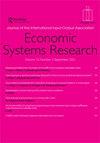Demographic change in Brazil and its impacts on CO2 emissions
IF 1.6
4区 经济学
Q2 ECONOMICS
引用次数: 7
Abstract
In recent years, the debate about demographic changes and its impacts on the economy has increased. The growth in the relative share of elderly people in the age pyramid may occur in the coming decades in many parts of the world, and their effects on the composition of consumption, notably on energy demand and emissions, are not yet known. This article estimates the changes in the pattern of consumption in Brazil due to the changes projected in the age pyramid in 2050 and the consequences of these changes on CO2 emissions. For this, projections will be made using an input–output model for the Brazilian economy for the year 2010 considering 67 productive sectors and six age groups. The results suggest that emissions grow less than proportionally to population growth and that the participation of sectors such as fuels and transport shows a small decrease in the consumption vector for 2050.巴西人口变化及其对二氧化碳排放的影响
近年来,关于人口结构变化及其对经济影响的争论有所增加。在未来几十年里,世界上许多地方的年龄金字塔中老年人的相对比例可能会出现增长,而它们对消费构成的影响,特别是对能源需求和排放的影响,目前尚不清楚。这篇文章估计了由于2050年预计的年龄金字塔的变化以及这些变化对二氧化碳排放的影响,巴西消费模式的变化。为此,将使用巴西2010年经济投入产出模型进行预测,考虑67个生产部门和6个年龄组。结果表明,排放量的增长低于人口增长的比例,燃料和运输等部门的参与表明,到2050年,消费向量将小幅下降。
本文章由计算机程序翻译,如有差异,请以英文原文为准。
求助全文
约1分钟内获得全文
求助全文
来源期刊

Economic Systems Research
ECONOMICS-
CiteScore
5.60
自引率
4.00%
发文量
17
期刊介绍:
Economic Systems Research is a double blind peer-reviewed scientific journal dedicated to the furtherance of theoretical and factual knowledge about economic systems, structures and processes, and their change through time and space, at the subnational, national and international level. The journal contains sensible, matter-of-fact tools and data for modelling, policy analysis, planning and decision making in large economic environments. It promotes understanding in economic thinking and between theoretical schools of East and West, North and South.
 求助内容:
求助内容: 应助结果提醒方式:
应助结果提醒方式:


